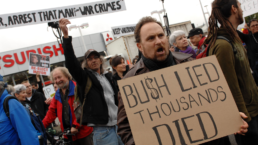More than 20 years later, are we ready to face up to the human toll of the war on terror?
By Norman Solomon, The Hill
As the anniversary of 9/11 approaches, candid public discourse about the “war on terror” is long overdue. Hindsight offers an opportunity to take a fresh look at the official pronouncements and unheeded dissent that came soon after September 11, 2001. The outlooks that prevailed at the time set the stage for historic disasters.

“Our responsibility to history is already clear — to answer these attacks and rid the world of evil,” President George W. Bush said in a speech at the Washington National Cathedral three days after terrorists took nearly 3,000 lives. A week later, he told a joint session of Congress that the impending war “will not end until every terrorist group of global reach has been found, stopped and defeated.”
Such resolve was inspiring to many. But the president’s vow to “rid the world of evil” was an announcement of an absurd goal, and it amounted to declaring endless war on an inexhaustible supply of enemies. Yet in a suddenly traumatized nation, suffused with grief, any concerns about such rhetoric were apt to seem beside the point; they got short shrift in the nation’s capital and news media.
At the start of October, a week before the U.S. attack on Afghanistan began, Detroit’s Catholic Bishop Thomas Gumbleton warned that “those who would rush to war and escalate the cycle of violence are completely out of touch with reality and with lessons of history.”
Recent Posts
‘Unconstitutional. Unethical. Authoritarian.’ ICE Bars Millions Of Immigrants From Bond Hearings
July 18, 2025
Take Action Now One watchdog said the new policy “seems like a blatant attempt to stop them from exercising their right to due process.”……
Americans Are Not Nearly Alarmed Enough About Climate Change
July 18, 2025
Take Action Now Americans still don’t comprehend how imminent, dangerous, and far-reaching the threat is—and journalists are partly to blame.By…
The IRS Is Building A Vast System To Share Millions Of Taxpayers’ Data With ICE
July 17, 2025
Take Action Now ProPublica has obtained the blueprint for the Trump administration’s unprecedented plan to turn over IRS records to Homeland Security…
Israel’s Sudden Assault On Syria Is Unchecked Aggression
July 17, 2025
Take Action Now Jerusalem is bombing Damascus and threatening al-Sharaa’s rule, while Washington was hoping to help the nascent government on…




